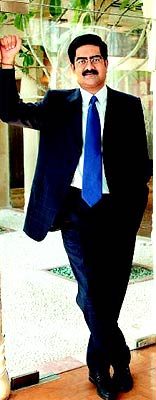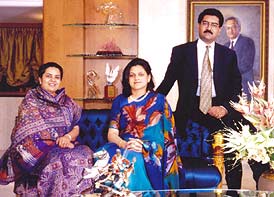Conservative Indian, ambitious businessman
29 June, 2006 | The Straits Times
ShareThe Straits Times (The Business Times, Weekend Edition)
Suresh Menon
29 June 2006
 The moonlit beaches of Monaco are deserted. It's time for indoor celebrations. At the Grimaldi Forum, an imposing convention centre, the result of the Ernst &Young World Entrepreneur award has been declared. South Africa's Bill Lynch is the winner. The TV camera crew have dismantled their equipment, reporters have returned their recorders and notepads to their pockets. The world's entrepreneurs are dancing, the champagne is flowing.
The moonlit beaches of Monaco are deserted. It's time for indoor celebrations. At the Grimaldi Forum, an imposing convention centre, the result of the Ernst &Young World Entrepreneur award has been declared. South Africa's Bill Lynch is the winner. The TV camera crew have dismantled their equipment, reporters have returned their recorders and notepads to their pockets. The world's entrepreneurs are dancing, the champagne is flowing.
Amid the pleasant chaos, this man sits on a chair, fondly watching his beautiful wife coyly trying a few steps.
Next moment he is back to his rather old-fashioned Nokia phone, sending SMS messages, or receiving them. Occasionally he smiles at his fellow billionaires. This is Kumar Mangalam Birla, the 39-year-old chairman of the US$ 10 billion Aditya Birla Group, based in India. He had come to Monaco as a strong contender for the entrepreneur of the year award.
So what does he think of all this now — since he did not turn out to be the winner?
He is as calm as ever. "I am happy I came," is the answer. It was an honour for him to be amongst the world's best and share the experiences.
He can't be that disappointed anyway. He has won many accolades. The World Economic Forum in Davos chose him as one of the Young Global Leaders two years back. "Businessman of the year" awards from various private and government agencies have become a rather monotonous affair.
The previous day, on June 9, in the lounge of the Monte Carlo Bay Hotel, in his striped business suit, he appeared an icon of calm. At times, his monosyllabic answers and cool demeanour put you off. "C'mon, you are sooo young, and with all this wealth, don't you feel that urge to splurge, indulge a bit at least?"
"No." The answer is typical of the man. "I am a businessman," he adds. "I am happy the way I am."
This teetotaller and vegetarian has the demeanour of an old, traditional, conservative Indian businessman. One can mistakenly conclude he is a look-alike from another era, considering the splurging, liberal Net generation of the present India. The Ferraris and Lamborghinis roaring outside on the serpentine roads of Monte Carlo are not his cup of tea. Western liberalism has missed this man. "I am an Indian in my sensibilities," he says, rather proudly.
He was only 28 when his father, the legendary Aditya Vikram Birla, died of cancer. He was thrust into a position of running an industrial empire spanning several continents. Traditional Indian businesses and observers dismissed him as being too small for the inherited shoes. They expected him to stumble. They could not be blamed. He carried the same expressions then too, obsessively calm, indifferent to the clamour of the business world and its assorted themes. In just six or seven years, though, the introvert, however, transformed a group built on hierarchical values from a US$ one billion fat behemoth to a leaner and meaner conglomerate with US$ 10 billion in market capitalisation.
He got rid of old financial practices, encouraged managers to question even his leadership style. Many senior e;xecutives, between the ages of 62 and 65, were politely told to retire. He wanted young ones "who can think out-of-the-box". He divested non-core businesses, acquired potentially competitive companies and untangled cross-holdings among group companies.
One case in point: a few years back his flagship Hindalco Industries acquired arch-rival Indal to become the largest player in the aluminium business in Asia. The acquisition was the largest all-cash deal India had so far seen.
When he took over, India itself was going through a radical reform process. Tariffs were d;ropping and new skills were the norm of the day. "It was a very tough process," he recalls. "We had to shut and sell some units. Some very painful moments."
If you observe him, walking around the city centre of Monte Carlo, or at the power lunches and cocktails, one thing is obvious. He is incredibly focused on what he is doing and can easily dismiss peripheral questions or issues. In contrast, he becomes quite vocal, when you talk about the group's future. He finds himself at the threshold of Fortune 500 entry, he says. "By 2010, we should be there." The growth graphs of the past decade in his company brochure show it's a convincing scenario. At the end of the curve is the target — US$ 18 to US$ 20 billion in market capitalisation at financial year 2010.
Who are the Birlas?
From cement, metals, clothing, IT, chemicals to telecom and mining they are all over the place both in India and elsewhere. The group employs about 72,000 people, has some 800,000 shareholders and aggregate revenue of US$ 7.9 billion as of this year. Aditya Birla Group has operations in 18 countries across four continents. Overseas operations add 30 per cent to the bottom line. Its 72 manufacturing units and sectoral services span India, Thailand, Indonesia, Malaysia, Philippines, Egypt, Canada, Australia and China. There are six core companies in the group stable.
The group is today the world number one in viscose staple fibre; the world's largest single-location palm oil producer; Asia's largest integrated aluminium producer, the world's eighth-largest producer of cement and the largest in a single geography; the number two private sector insurance company and the fourth-largest asset management company in India.
The Birla Group was founded by Baldeo Das BirIa, a member of the successful Marwari community from the western state of Rajasthan. He moved to the eastern city of Calcutta to set up the family business in the late 19th century, and with it established close ties to the freedom movement of the time. The family were close friends of Mahatma Gandhi.
In post-independent India, one grew up with the names Tatas and Birlas — two industrial houses thriving with a clean image despite the stranglehold of a command economy and Nehruvian socialistic mantras. India's infamous licence raj was in full force, the bureaucratic juggernaut ready to stall and smear any meaningful business enterprise.
 Perseverance and social commitment perhaps, saw them through those years. They command respect and awe even in today's reformist India, just as they did a hundred years ago. This young man's demeanour is reflective of those times indeed. Other than business, what gives him a kick? "Family", the answer is spontaneous and not necessarily a cliched one.
Perseverance and social commitment perhaps, saw them through those years. They command respect and awe even in today's reformist India, just as they did a hundred years ago. This young man's demeanour is reflective of those times indeed. Other than business, what gives him a kick? "Family", the answer is spontaneous and not necessarily a cliched one.
The whole family went with him to Monaco for the award deliberations. Wife Neerja is always around. At one of the elaborate Mediterranean lunches held outdoors during the week, she opens the tiffin box from home — home-made chapattis for Mr Birla, who munches them with unconcern.
His three children — Ananyashree, Aryaman Vikram and Advaitesha — are well within the control of their maid from India on the lawns. His grandparents were at the Grimaldi Forum on the award night on June 10. Mother was on the way to France and the day after they were all to go to one of their family's houses, in some French village. "My mother influenced me the most in my formative years and then the father," Mr. Birla says with a tinge of nostalgia. The latter's premature death was the most tragic event of his life.
You mention about his privileged background and he is not particularly amused. "There were hard times like anybody else," he reminds you. Passing the tough Indian chartered accountant examination was one of them. True, being a Birla won't help you there much. He sat for his MBA from the London Business School, which, he says was fun. Then came the tough times of stepping into the shoes of his legendary father, at the age of 28.
Born on June 14, 1967, Kumar Mangalam Birla was raised in Calcutta and Mumbai. He says that chaotic Calcutta remains his favourite city. The most remarkable moments again are reserved for the family. He fondly remembers the birth of his children as those most joyous moments. He wants them to come up in life like anybody else, overlooking the silver spoons. The conservative Birla married at age 22. No surprises here. It was an arranged marriage. Neerja is a full-time housewife and has no business ambitions. The family needs her more, says her husband.
Mr Birla is not a conventional product of the free market. He says he believes in trusteeship, something his grandfather instilled in him. Part of the group's profits are ploughed back into welfare initiatives. "We do work in villages around factory locations, building houses, creating model villages," he says.
Mr Birla has seen both faces of India — the command structure and now the fierce competition, thanks to the about-turn on the role of the market.
"Indian entrepreneurship is coming of age. More education and exposure to the outside world through the Internet are making the young ambitious. Parents and children are much more aware of the value of education. Parents are willing to spend much more on education. Knowledge is power."
Doesn't the changing face of India scare the Birlas, who have obviously enjoyed the rewards of monopoly in the previous decades? "No," says Mr Birla. "The group had outside exposure since the 70s in South East Asia. So adapting was easy. We were not afraid of competition at all."
So what are the future plans? He is looking at major mergers and acquisitions, which obviously he "can't reveal now". Well, not of the Mittal scale, he cautions.
The group acquired a couple of mines in Australia in the last few years. Forays were made into Egypt and Canada as well. Thailand remains one of his favourite locations. As early as Wednesday, Aditya Birla Nuvo, one of the group's core companies, made a US$ 125 million open offer for Canada's leading business process outsourcing companies, Minacs Worldwide.
One can't help repeating the question: "Other than business what interests you?" Suddenly he has found an answer. "Art," he says, he is not a painter himself. "I buy paintings occasionally," he says modestly.
"What else?"
"In my free time I exercise, spend time with family, read management books." He likes music, Hindi movies. The Indian in his sensibilities is passionate about his country. He reminds you India is the second largest, and fastest emerging economy. "There's a political will to see India do better."
During a forum on the emerging markets as part of the Ernst &Young world summit, he was vehemently defending India against Western complaints that Indian reforms were moving at a snail's pace. He reminded the participants that India was a democracy, where decision making could not be unilateral and that the fruits of a free market should reach the downtrodden.
Democracy before blatant wealth accumulation was the chorus.
"So what's your message to the budding entrepreneurs of India?"
"Have faith in yourself, and persevere," is the cliched answer.
Do you have faith in yourself? "Absolutely." Mr. Birla excuses himself. Another busy afternoon awaits him.






